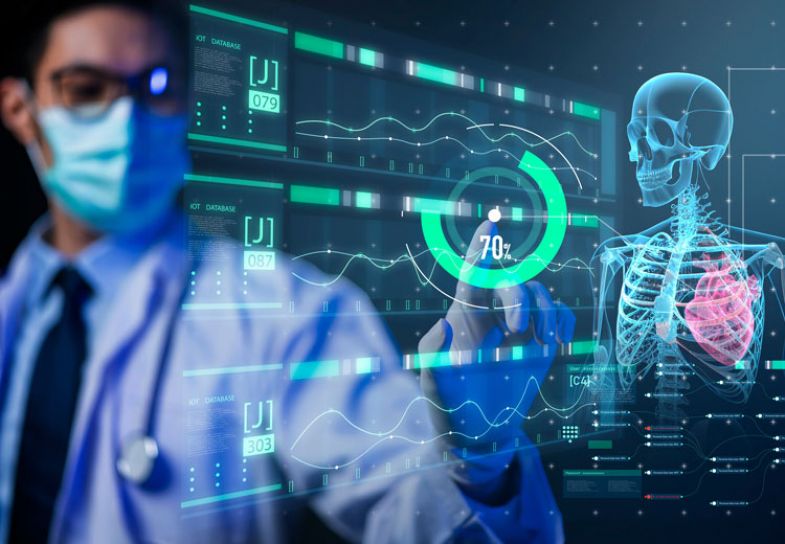Table of Contents
The intersection of artificial intelligence (AI) and medical science is reshaping healthcare, paving the way for innovative educational methods and enhancing patient interaction solutions.
1. AI in Medical Education
AI is evolving medical education by offering personalized learning experiences, simulating complex medical scenarios, and providing advanced diagnostic tools for practice.
In medical schools, AI-driven platforms like virtual reality and augmented reality are enabling students to interact with 3D anatomical models, practice surgical techniques, and understand the intricate workings of the human body. Additionally, AI algorithms can adapt to individual learning paces, providing customized educational content that meets specific needs and fills knowledge gaps. This personalized approach helps students grasp complex concepts more effectively and retain information longer. Furthermore, AI can analyze vast volumes of medical data to update students on the latest research and advancements in the field. By integrating AI into medical education, institutions can produce a generation of healthcare professionals who are well-equipped with the knowledge and skills to navigate the evolving medical landscape.
2. Diagnostic Precision and Decision Support
AI&8217;s ability to analyze large datasets and identify patterns is revolutionizing diagnostic precision and clinical decision support. Machine learning algorithms can process and interpret medical images, such as X-rays, MRIs, and CT scans, with remarkable accuracy, often surpassing human capabilities. This not only reduces the risk of misdiagnosis but also speeds up the diagnostic process, allowing for timely intervention. AI-powered decision support systems can assist healthcare providers by offering evidence-based recommendations and predicting patient outcomes based on historical data. For instance, predictive analytics can help identify patients at risk of developing chronic conditions, enabling proactive measures to prevent complications. By enhancing diagnostic precision and providing reliable decision support, AI is empowering healthcare professionals to deliver better patient care and improve clinical outcomes.
3. Enhanced Patient Interaction through AI
AI is transforming patient interaction by enabling personalized communication, improving patient engagement, and facilitating better healthcare experiences. Chatbots and virtual health assistants, powered by natural language processing, can provide 24/7 support, answer medical queries, and guide patients through their healthcare journeys. These AI-driven tools can triage symptoms, schedule appointments, and even remind patients to take their medications, thereby improving adherence to treatment plans. Additionally, AI can analyze patient data to deliver tailored health advice and monitor their progress remotely. This level of personalized interaction fosters trust and encourages patients to actively participate in their care. Moreover, AI can bridge language barriers and ensure clear communication between patients and healthcare providers, enhancing overall satisfaction. As AI continues to evolve, it holds the potential to transform routine patient interactions into meaningful and effective engagements, ultimately improving healthcare delivery and patient outcomes.
4. Ethical Considerations and Data Privacy
While AI offers numerous benefits in healthcare, it also raises important ethical considerations and data privacy concerns. The implementation of AI in medical practice requires access to large amounts of sensitive patient data, raising questions about data security and patient privacy. Ensuring that AI systems are transparent, unbiased, and accountable is crucial to maintaining public trust. Additionally, healthcare professionals must be trained to understand and critically evaluate AI recommendations to prevent over-reliance on technology. Ethical considerations also extend to the equitable deployment of AI, ensuring that all patients, regardless of socioeconomic status or geographic location, have access to AI-driven healthcare solutions. Addressing these concerns involves creating robust regulatory frameworks, promoting transparency in AI algorithms, and fostering a culture of ethical AI development. By tackling these issues, the healthcare industry can harness the full potential of AI while safeguarding patient rights and maintaining ethical standards.
5. Future Prospects and Innovations
The future of AI in medicine holds exciting prospects and innovations that could further revolutionize healthcare delivery. Advances in AI research are likely to lead to more sophisticated diagnostic tools, personalized treatment plans, and innovative patient care models. For instance, AI-driven genomic analysis could unlock new possibilities in precision medicine, offering tailored therapies based on an individual’s genetic makeup. Moreover, AI could facilitate the development of smart medical devices and wearable technology that continuously monitor patients’ health and provide real-time feedback. As AI technology continues to evolve, it could enable seamless integration of electronic health records, improving data interoperability and enhancing collaborative care. Innovations in AI are also expected to streamline administrative processes, reducing the burden on healthcare providers and allowing them to focus more on patient care. By embracing these future prospects and innovations, the medical community can continue to leverage AI to improve healthcare outcomes, enhance patient experiences, and drive the next wave of medical advancements.
